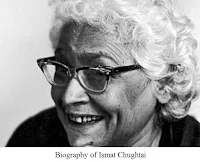Biography of Ismat Chughtai:
Ismat Chughtai (1915–1991) was a prominent Urdu language writer and a fearless feminist voice in the Indian subcontinent. She was born on August 21, 1915, in Badayun, Uttar Pradesh, British India (now in Uttar Pradesh, India), and she passed away on October 24, 1991. Ismat Chughtai is celebrated for her contribution to Urdu literature and her unwavering commitment to challenging societal norms through her writings.
 |
| Biography of Ismat Chughtai |
Key Points in Ismat Chughtai's Biography:
1. Early Life of Ismat Chughtai:
Ismat Chughtai was born into a family of landlords in British India. She received her early education at home and later attended Aligarh Muslim University.
2. Literary Career:
Ismat Chughtai began her literary career in the 1930s. She wrote short stories, novels, and essays that explored the complexities of human relationships, societal norms, and women's issues.
Her writing style was characterized by realism, wit, and a deep understanding of human psychology.
3. Ismat Chughtai's Association with the Progressive Writers' Movement:
Ismat Chughtai was associated with the Progressive Writers' Movement, a literary and social movement that aimed to address social issues and advocate for progressive ideals through literature.
She collaborated with other prominent writers like Saadat Hasan Manto, Faiz Ahmed Faiz, and others who were part of the movement.
4. Controversial Works:
Ismat Chughtai's writing often delved into themes that were considered controversial in conservative society. Her short story "Lihaaf" ("The Quilt") faced obscenity charges for its exploration of same-sex relationships.
5. Film and Screenwriting:
Apart from her work in literature, Ismat Chughtai was involved in the film industry. She wrote scripts for films and worked on screenplays.
Her association with the film "Garm Hawa" (1973), directed by M.S. Sathyu, is noteworthy.
6. Notable Works of Ismat Chughtai:
Some of Ismat Chughtai's notable works include "Tedhi Lakeer" (The Crooked Line), "Dozakhnama" (The Saga of Hell), and "Aadhi Aurat Aadha Khwab" (Half Woman, Half Dream).
7. Social Activism:
Ismat Chughtai was known for her advocacy of women's rights and social justice. Her writings often challenged patriarchal norms and gave a voice to the experiences of women.
8. Awards and Recognition:
Ismat Chughtai received several awards for her literary contributions. In 1976, she was awarded the Padma Shri, one of India's highest civilian honors.
9. Legacy of Ismat Chughtai:
Ismat Chughtai's legacy lies in her fearless writing, which confronted societal taboos and advocated for the rights of women. She remains an influential figure in Urdu literature, particularly for her exploration of the human psyche and the complexities of relationships.
Ismat Chughtai's literary work and her commitment to social issues have left an indelible mark on Urdu literature. Her contributions continue to be celebrated, and her writings remain relevant for their exploration of timeless themes.